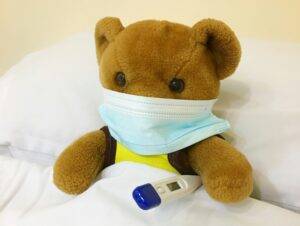Newborn congestion is a common concern among new parents. If you’ve ever noticed your baby’s breathing sounding stuffy or strained, you’re not alone. Many parents wonder why their newborn baby is congested and if it’s something to worry about.
In most cases, congestion in newborns isn’t dangerous, but it’s important to understand its causes and how to provide relief. This article will explore the causes of newborn congestion, the symptoms to watch for, and the best remedies to help your baby breathe easier.
What Exactly When Newborn Baby is Congested
Newborn congestion is a condition where the baby’s nasal passages or chest are blocked with mucus, causing breathing to become difficult. Since newborns have very small and narrow nasal passages, it doesn’t take much mucus to cause noticeable congestion.
Many babies experience mild congestion in the first few months of life, especially as their immune systems are still developing. Note that congestion isn’t the same as a cold or respiratory infection, although these illnesses also cause congestion as a symptom. Most cases of newborn congestion clear up on their own and don’t require medical treatment. However, persistent or severe congestion might indicate an underlying issue that needs attention.
Types of Newborn Congestion
- Nasal Congestion: This is the most common type. This happens when the nasal passages are blocked or inflamed, leading to difficulty breathing through the nose.
- Chest Congestion: Less common in newborns, this involves mucus buildup in the airways or lungs, leading to coughing or wheezing. It’s important to monitor your baby’s breathing.
The Anatomy of Newborn Breathing
Newborns are obligate nasal breathers, meaning they breathe primarily through their noses rather than their mouths. This is a natural survival mechanism that allows them to breathe while feeding. However, it also means that even mild nasal congestion causes noticeable discomfort.
Babies rely heavily on clear nasal passages for comfortable breathing, underscoring why congestion can be distressing to babies and parents. Learn more about breathing patterns in newborns in this article: Understanding Normal and Abnormal Breathing Patterns and How to Identify Them
Newborn Baby is Congested: Common Causes
Understanding the root cause of your baby’s congestion helps you take the appropriate steps to relieve it. Here are some of the most common causes.
1. Normal Newborn Physiology
Newborns experience mild congestion as part of their normal development. It’s common to sound congested during their first few months of life. This is sometimes called “physiologic congestion“ because the baby’s respiratory system is still maturing. Their nasal passages are tiny, and even a small amount of mucus makes breathing noisy.
Newborns also tend to have extra fluid in their bodies, contributing to congestion. This is common in the first few days after birth as their bodies adjust to life outside the womb.
2. Dry Indoor Air
Dry air irritates your baby’s nasal passages and dries them out, leading to congestion. This is common in winter when heaters are used, as indoor heating systems strip moisture from the air. Babies are more sensitive to changes in their environment than adults, so something as simple as dry air causes discomfort.
3. Colds and Viral Infections
Like adults, babies catch colds and other viral infections that lead to congestion. It’s common to experience several colds in their first year of life as their immune systems are still developing. When a newborn catches a cold, the virus causes the nasal passages to produce excess mucus, leading to congestion.
In some cases, the respiratory syncytial virus (RSV) causes more severe respiratory symptoms, including congestion, wheezing, and difficulty breathing. While RSV is mild, it’s more serious for younger babies, especially those under six months of age.
4. Allergies and Sensitivities
Although newborns are less likely to have allergies compared to older children or adults, it’s still possible. Environmental factors like dust, pet dander, pollen, or even certain fragrances and cleaning products irritate your baby’s nasal passages. These lead to sneezing, watery eyes, and nasal congestion.
If your baby’s congestion seems persistent and accompanied by a rash or watery eyes, consult your pediatrician. Food allergies, although rare in newborns, could also cause congestion if the baby is sensitive to some components in breast milk or formula.
5. Exposure to Irritants
Environmental irritants, like cigarette smoke, strong perfumes, or cleaning products, easily irritate your newborn’s delicate respiratory system. Babies have sensitive airways, and brief exposure to irritants triggers congestion. Secondhand smoke is harmful and has been linked to respiratory issues in infants, including congestion and wheezing. If you or another household member smokes, avoid exposing your baby.
6. Acid Reflux (GER)
Gastroesophageal reflux (GER), commonly known as acid reflux, is when acid backs up into the esophagus. This irritates the throat and nasal passages, causing symptoms like coughing, gagging, or nasal congestion. If your baby frequently spits up or seems uncomfortable after feeding acid reflux might be contributing to their congestion.
7. Congenital Conditions
In rare cases, structural abnormalities in the nasal passages or respiratory system cause persistent congestion. One such condition is choanal atresia, a congenital disorder where the back of the nasal passage is blocked, preventing airflow through the nose. Babies born with this condition have difficulty breathing through their nose and may require surgical intervention.
Newborn Baby is Congested: Recognizing the Symptoms
Newborns can’t tell us when they’re uncomfortable, so pay attention to signs of congestion. Some symptoms are obvious, while others are subtle. Here’s what to watch for:
- Noisy Breathing: This is one of the first signs. You might hear snorting, grunting, or whistling sounds as your baby tries to breathe through their blocked nasal passages. This noise is noticeable when your baby is feeding or sleeping.
- Difficulty Feeding: Since newborns are nasal breathers, congestion makes it harder for them to feed. Babies struggle to latch the breast or bottle or pause frequently to catch their breath. If your baby seems fussy during feedings or eating less than usual, nasal congestion might be the cause.
- Coughing or Wheezing: If your baby has chest congestion, you will notice them coughing or wheezing, especially when lying down. While occasional coughing is normal, frequent or severe wheezing indicates that mucus is building up in the lungs, making it difficult for your baby to breathe.
- Restlessness or Difficulty Sleeping: Congested babies have trouble sleeping, as they struggle to breathe comfortably while lying down. You notice that your baby wakes up frequently during naps or bedtime, or they’re fussy and irritable than usual.

- Runny or Stuffy Nose: This happens if your baby has a cold. You’ll notice clear mucus at first, but it becomes thicker and yellow or green as the illness progresses. A stuffy nose, where the mucus isn’t visible but causes breathing issues, is common in congested babies.
- Fever: Congestion alone doesn’t cause fever. Fever could be an accompanying system. A fever of 100.4°F (38°C) or higher could signal an infection, such as a cold or the flu. For babies younger than three months, any fever should be reported to a pediatrician immediately.
Effective Remedies for Newborn Congestion
Now that we’ve covered the causes and symptoms of newborn congestion, let’s explore some remedies. Most congestion in newborns can be treated at home with simple, effective strategies.
1. Humidifier for Moisture
Using a cool mist humidifier in your baby’s room is one of the easiest and most effective ways to relieve congestion. Adding moisture to the air helps thin out and loosen mucus and keeps your baby’s nasal passages from drying out. This is especially helpful if dry air is the cause of the congestion. Clean the humidifier regularly to prevent mold and bacteria buildup in its components.
2. Saline Nasal Drops
Saline drops are safe for newborns and a game changer in clearing a stuffy nose. Saline drops thin the mucus, making it easier for your baby. After applying, use a bulb syringe or nasal aspirator to remove the loosened mucus.
3. Elevate Your Baby’s Head
If your baby’s congestion affects their sleep, try elevating their head slightly while sleeping. Place a rolled-up towel or small wedge under the crib mattress (never under your baby) to keep their head at a gentle incline. This position helps drainage and makes breathing easier. Be cautious and ensure you still practice safe sleep for newborns. Keep your baby in a safe sleeping position on their back.
4. Steam Therapy
Run a hot shower and sit with your baby for 10-15 minutes in the bathroom. Let your baby breathe in the warm and moist air. The steam loosens mucus and makes it easier for your baby to breathe. Ensure the room is warm and moist, not too hot, to avoid discomfort.
5. Keeping Hydrated
If your baby is congested due to a cold or viral infection, keeping them well-hydrated is key. If breastfeeding, offer extra nursing sessions. If formula-fed, offer extra bottles as needed. This provides hydration and comfort, thinning out the mucus, and making it easier for your baby to clear their airways. Proper hydration is essential for the body to fight off infections and viruses.
6. Nasal Suction Devices
A bulb syringe or nasal aspirator are effective tools to gently remove mucus from your baby’s nose, especially after using saline drops. These devices are designed to clear nasal passages, by suctioning mucus, but use them carefully to avoid irritation. Always clean the suction device after each use.
Learn why this device is a newborn essential in this article: 11 Often Overlooked Newborn Essentials—New Moms Ought to Know
7. Avoid Environmental Irritants
To prevent further irritation of your baby’s nasal passages, eliminate potential irritants in their environment. This includes avoiding smoking around your baby, reducing the use of strong cleaning products or perfumes, and keeping dust and allergens to a minimum in your home.
When Should You See a Doctor?
While most cases of newborn congestion are mild and resolve on their own, there are times when medical attention is necessary.

- Breathing Difficulties or Labored Breathing: If your baby seems to be struggling to breathe, has rapid breathing, or shows signs of respiratory distress such as nostril flaring or grunting with each breath, seek medical attention immediately. These are signs that your baby’s body is working harder than normal to get enough oxygen, which could indicate a more serious issue.
- Persistent Congestion: If your baby’s congestion lasts beyond one week or worsens despite home remedies, consult your pediatrician. Persistent congestion could be a sign of an underlying condition, such as allergies or a structural issue with the nasal passages.
- High Fever or Lethargy: If your baby has an accompanying fever of 100.4F or 38C or higher, or if they seem lethargic or refuse to eat, contact your pediatrician immediately. Fever in babies, younger than three months, should always be managed by a doctor, especially if it’s accompanied by congestion. Fever in young infants is a sign of infection, and early intervention is key to preventing complications.
- Refusal to Eat or Drink: If your baby is refusing to eat or drink, this could be a sign of illness or dehydration, and it’s important to seek medical attention.
- Signs of Dehydration: Dehydration is a serious concern in babies, especially if they’re not feeding well due to congestion. If your baby has fewer wet diapers than usual, or if their mouth seems dry, contact your pediatrician for advice.
Manage Your Newborn Baby Congestion with Easy Home Remedies
Newborn congestion is a common issue that most parents will encounter. It can be stressful when your newborn baby is congested, but it’s usually not a cause for alarm. Thankfully, the congestion is mild and easily manageable with home remedies such as saline drops, a cool mist humidifier, and keeping your baby well-hydrated.
However, if your baby shows signs of difficulty breathing, has a persistent fever, or the congestion lasts longer than expected, consult with your pediatrician. Monitor your baby’s symptoms and seek medical help if you notice signs of distress or persistent congestion. For more information on newborn health and care, check out the Omega Pediatrics blog.






